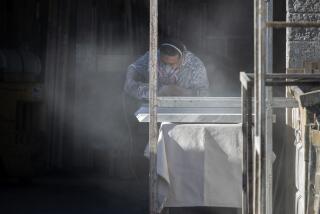Makers of Hazardous Products Get Legal Shield : Asbestos: State justices rule that manufacturer can defeat claims by showing that dangers were not known in the scientific community.
SAN FRANCISCO — The state Supreme Court on Thursday gave new legal protection to the makers of asbestos and other hazardous products against suits contending that the manufacturers had improperly failed to warn of potential injury.
The justices, ruling against a worker who brought suit after contracting asbestos-related lung disease, held 6 to 1 that a manufacturer can defeat such claims by showing that the risks were not known in the scientific community when the product was made.
“How can one warn of something that is unknowable?” asked Justice Edward A. Panelli, author of the court’s majority opinion.
The ruling came as thousands of asbestos-related suits are pending in the California courts--an estimated 5,000 in Los Angeles County alone. But while the decision will aid manufacturers and distributors defending against such claims, the way is still clear for plaintiffs to prevail on a variety of grounds, attorneys said.
In the ruling, the justices placed a new restriction on a landmark, 28-year-old legal doctrine allowing manufacturers to be held liable for defective products and harmful products, regardless of fault.
The aim of imposing strict liability was to place the cost of injury on product makers--as a cost of doing business--rather than on injured people unable to protect themselves.
The court held, however, that the doctrine “was never intended to make the manufacturer or distributor of a product its insurer.” While victims may sue under the doctrine for defects in the design or manufacture of a harmful product, a manufacturer can counter a claim of failure to warn by proving the risks could not be known through scientific knowledge at the time, the court said.
The decision came as a victory for an array of business groups that joined Owens-Corning Fiberglas Corp., Fibreboard Corp. and other firms named as defendants in a suit by Carl Anderson, a former Long Beach Naval Shipyard worker who contracted asbestosis after removing and installing insulation products aboard ship.
The Product Liability Advisory Council, representing 80 large corporations, and the Assn. for California Tort Reform argued that a ruling against the defendants would discourage the development of new products. The California Trial Lawyers Assn., backing Anderson, replied that a ruling for the worker would encourage manufacturers to perform more research into product safety.
David A. Rosen of Los Angeles, an attorney for the trial lawyers group, called the ruling “a setback to the court system,” saying it would lengthen product-liability cases as opposing sides argued over whether defendants knew or could have known about the risks of their products. Rosen expressed confidence, however, that plaintiffs in asbestos and other cases would prevail. “This won’t change the results,” he said.
Gerald H.B. Kane Jr. of Hermosa Beach, attorney for Anderson, expressed disappointment with the decision. “It’s elemental justice that when someone gets sick from asbestos, and the loss must fall either on some poor worker or the manufacturer . . . it should fall on the manufacturer, who made the product and profited from its sale,” Kane said.
The ruling was welcomed by George A. Cumming Jr. of San Francisco, an attorney for Fibreboard. A decision for Anderson, he said, would likely have resulted in manufacturers issuing excessive warnings in order to protect themselves from suits, but providing little benefit to workers and consumers. “There’s a great danger of warning too often--like the boy who cried wolf,” said Cumming.
The suit was brought by Anderson in 1984, alleging he had contracted the ailment while working at the shipyard from 1941 to 1976. Anderson sought damages from Owens-Corning and other asbestos makers on grounds the product was defectively designed and manufactured and the firms had failed to warn of its potential danger.
The defendants argued that to counter the claim of failure to warn, they should be allowed to introduce evidence showing that when the product was made, there was no scientific evidence it could prove harmful. A state Court of Appeal rejected that contention, saying such evidence was “irrelevant” because the reasonableness of the manufacturers’ conduct was not at issue.
In Thursday’s ruling, the high court said the evidence was admissible. Panelli noted that while there was some division over the issue, most courts have held that manufacturers cannot be held liable for failure to warn without proof they knew or should have known of a product’s hazards.
“While a manufacturing or design defect can be evaluated without reference to the conduct of the manufacturer, the giving of a warning cannot,” Panelli wrote. “The (giving of a warning) requires the communicating of something to someone. How can one warn of something that is unknowable?”
CONSOLIDATION DECISION: Federal judges will decide whether consolidating the nation’s 31,000 asbestos cases will help overwhelmed courts. D5
More to Read
Inside the business of entertainment
The Wide Shot brings you news, analysis and insights on everything from streaming wars to production — and what it all means for the future.
You may occasionally receive promotional content from the Los Angeles Times.










